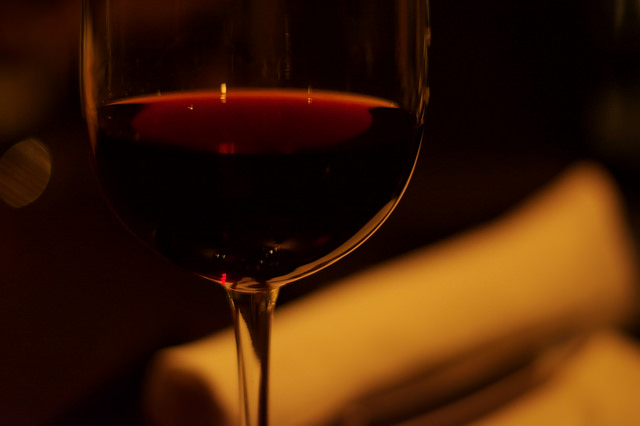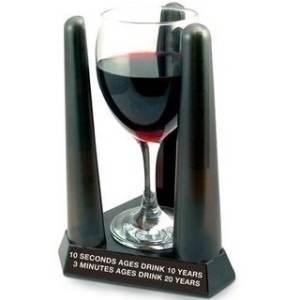
Can we really speed up the clock? Not with magnets, that’s for damn sure.
***
This post started last week when /u/Engr89 over in /r/skeptic posted about her or his friend’s “wine ager,” as in “thing that ages wine (quickly).” Check over there for a look, because the “questions” it raised were amazing. The device in question is this:

Everything about this is wonderful. See, there’s a magnet in each of the three little spikes, and apparently if you leave a glass of wine in there for ten seconds, it gets you ten years. Three minutes gets you twenty, so why you wouldn’t just put it in for ten, take it out again, and repeat to get the whole process over with in twenty-five seconds or so is beyond me. But, you know, that’s the least of this thing’s problems.
Because we know that magnets don’t age things. They don’t even trigger any of the chemical processes that might mimic aging. There’s literally nothing to this. And just so we’re clear, there’s nothing to this one, either…

…or this one…

…or any of the products that claim that magnets will age your wine. They won’t.
But in doing a little research for this post, I came across two other devices that purport to “age” your alcohol, this time with chemistry. And at least that’s a better line of reasoning.
One aims to “age” your whiskey, and the other your wine, and god bless ’em, the good folks over at Gizmodo have actually tested both of them.
The “Whiskey Sticks” I might’ve mentioned on here before. I’ve certainly mentioned them to my friends. The basic idea is that if you leave them in your whiskey for a bit, they’ll “age” it, which in whiskey usually means a taste that’s a little softer around the edges, a little more flavourful, a little rounder. In theory the sticks have a lot of surface area with which to interact with the whiskey, much more than in a barrel, and also a lot more oxygen around (than in a closed barrel) to speed up the process. They do change the flavour of the whiskey — something the magnets can’t even begin to claim to do — but the results are… well, not so great. If you want better whiskey, I’m just going to advise you to try buying better whiskey.
The “Clef du Vin” (that’s French for “Wine Key” — yeah, you’re impressed, I know), on the other hand, is a surprise. It’s not a miracle-aging stick, but it does an okay impression of one, if you squint and shake your head a little. Like the Whiskey Sticks, they definitely change the flavour of the drink. And if you use it too much, it can definitely make it worse. But to the reviewers’ (and my) surprise, the reports seem to indicate that a little exposure to the strange metal stick does seem to improve the taste of harsher wines. That is to say, in a subjective way, if you don’t like bold tannins, this might be a fun little piece of kit to try out.
And if you’re into that, try double-blinded taste-tests with the wine key and with a blender — yes, a blender — which is by far the fastest way ever to aerate your wine. And a fun party trick.
If you’ve ever tried a gizmo that supposedly changes the flavour or character of your alcoholic drinks, drop me a line on Twitter or leave a note on our Facebook page. I’d love to hear your experiences and to see if we could replicate them.
Thanks for reading!
***
Richard Ford Burley is a doctoral candidate in English at Boston College, where he’s writing about remix culture and the processes that generate texts in the Middle Ages and on the internet. In his spare time he writes about science, skepticism, and feminism (and pseudo-science drink aging techniques) here at This Week In Tomorrow.
